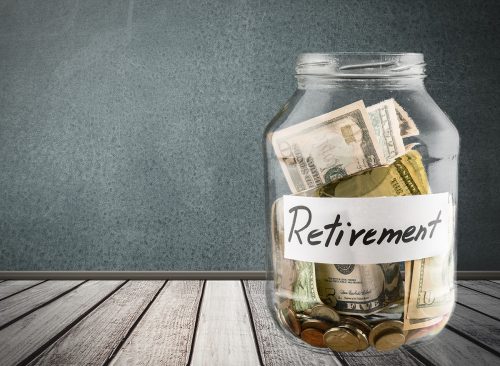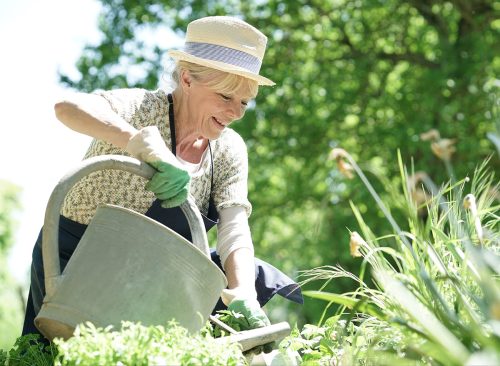
Ah, retirement! The time of life most of us dream about, when the need to punch a clock is over and time becomes entirely our own. But that era, like any other, comes with lessons. Most retirement advice is focused on saving enough money or being prepared for health challenges, but retirement experts say there’s a lot more you need to know about those years to live them at your happiest. These are the top 20 things people learn after retirement, according to people who are there.

In the Wall Street Journal, Steve Kreider Yoder said the best thing he and his wife did to prepare for retirement was “build out caves where we could be apart.” He has a workshop three floors below his wife has her own room. “Some retired couples talk about the initial shock of spending most weekday hours under one roof,” he writes. “‘Parallel play’ may be the key to happiness in later life… Allowance for solitude seems a secret to retired bliss.”

“So much preparation for retirement involves saving and investing that you sometimes forget there’s much more to retirement than money,” writes Tom Sightings in U.S. News & World Report. “Many retirees start out feeling financially secure, but then realize they don’t have any idea what to do in retirement. While it’s essential to plan for how you’re going to generate the income you need, it’s also important to figure out the interests and activities that will make retirement a rewarding and worthwhile period of life.”

“Retirees frequently don’t realize how much their career provided a sense of identity and self-worth,” the WSJ reports. Betty Wang, a financial adviser in Denver, said many retired people fail to grasp the need to plan for a different source of purpose in retirement. According to financial planner Edward Jones, 54% of retirees wish they planned better for the non-financial aspects of retirement.

Retired entrepreneur Jim Pilzner, 78, regrets not setting goals for himself when he retired four years ago. He became bored playing golf and meeting friends for lunch. “I would counsel my younger self, and any other active, achieving person to recognize what drives them and what success really means,” he told the Wall Street Journal. Pilzner decided to go back to school, studying toward a degree in political science.

According to the Harvard Study of Adult Development, the best predictor of longevity, health and happiness in old age is the quality of your relationships. “Loneliness is a well-recognized risk of retirement as friends move away or die off. While retirement is a time to relax, you still need to make an effort to keep your personal relationships alive with your spouse, children and friends,” writes Sightings. “Consider doing something special for your spouse, make an effort to see your children, and pick up the phone to call a friend.”

“After years of having structure imposed on our lives, it takes some adjustment to live a life with less structure,” says Fritz Gilbert at The Retirement Manifesto. “Personally, I love the freedom that comes with shedding externally imposed structure. After two years of retirement, I’ve also found that a bit of self-imposed structure smooths the journey for me.” Taking classes at the gym helps him feel better about his day. “Play around with how much structure works for you, and realize your schedule is something you now control,” he advises.

Retirement might last longer than you think. Arthur Parmentier, 69, told the WSJ he regretted retiring at 65, rather than working a few more years. That’s partly because he took a lower Social Security benefit. “Had I waited two more years or maybe three, I would have been quite comfortable,” he said. “I think now that I may live well into my 80s, so I have to be prepared for that.” The life expectancy for a 65-year-old is 84 for men and nearly 87 for women, according to actuarial data. Most Americans underestimate that.

Conversely, Jay Holt, 74, told the WSJ he regretted not retiring sooner. He planned to spend his retirement playing polo. But in 2015, he injured himself and had to quit the sport. He said he wished he had given himself a few more years to play. Extra years of work also may mean you’ve delayed desired travel and plans to spend more time with family.

“Retiring has forced Karen and me, as we prepare for our latter years, to confront realities we can no longer avoid: Our time is finite, we are growing frailer, old age costs money, we aren’t sure how we fit into the world,” writes Kreider Yoder.

“Work is boring, retirement is the time to add some excitement to your life,” writes Gilbert. “What are you curious about trying? What’s holding you back? Retirement is the time to try new things, and the only limit is your imagination (and, perhaps, your risk tolerance).”

“I’ve found myself assuring Dad he needn’t worry about running out of money—partly thanks to the long-term-care policy he and Mom took out to avoid burdening us kids—at the same time our financial planner is telling me to stop worrying about running out,” writes Kreider Yoder.

“Retirement changes as the days go by, and it’s best to embrace the fluidity,” says Gilbert. “Go with the flow, listen to your mind, and follow your instincts. What you experience in the first six months is not what your retirement will be. Those first six months are the honeymoon, and it’s a blast. Go with that flow, but realize the river changes as it moves downstream.”

Retiree Cindy Ladage says the idea that you’ll have tons of free time in retirement is a “myth.” “It is amazing how quickly that time fills up, and the most important aspect for me is to be sure that it fills up with things that I want to fill it with.” She advises not volunteering or signing up for major responsibilities for six months after retirement. At that point, you’ll have solid perspective on how you want to spend your time.

“Many people identify themselves and others by the work they do. After you retire, and especially as the years go on, people are less interested in what you used to do and more interested in what you are doing now,” writes Sightings. “Are you a golfer, a gardener, a volunteer or a world traveler? Establishing a new identity can be a challenge, but also an opportunity for a fresh start.”

“With retirement, there is finally time to clean out the closet and adjust the house to the way you want it,” says Ladage. “I spent the first few weeks and months cleaning out closets and cabinets. It is amazing how many things I thought I needed that I didn’t. It is a wonderful feeling to have time to reorganize and get the house in order.”

“Retirement offers the priceless gift of time, but you need to determine how to use it,” says Sightings. “Without a goal or some kind of focus, you might feel busy but have nothing to show for it. It’s easy to fritter away time watching TV, going shopping, running errands, and keeping house. For many people, a truly rewarding retirement comes only when they try to accomplish something that’s important to them. That might mean learning a new language, starting a new business, or contributing to a favorite charity.”

“One of the wonderful things about retirement is that it has given us time to reflect on the many aspects of our lives for which we owe gratitude to our parents,” writes Karen Kreider Yoder. “It has been a blessing that we could retire while his parents were still with us. With retirement comes time, and we’ve been able to travel [to visit them] for longer stretches.”

“Retirement is a time to give back, and finding purpose by doing things that benefit others will likely be the most rewarding use of your time,” says Gilbert. ” Find ways to get involved, and choose to connect with people who have a generous attitude. Never stop learning, and challenge yourself to continually learn new things.”

“Since I am retired, everyone assumes that I am available for almost anything at almost any time,” writes Ladage. “That is simply not true. I am often available for many things and am willing to help when I can, but I had to learn that it is OK to say ‘no,’ and not have to say anything else.”

“Even after you stop working and your kids are grown up, life goes on. And the changes will continue throughout retirement,” says Sightings. “Children may come and go, grandchildren may arrive and you may confront a major medical issue. Retired people sometimes get divorced, start new relationships, or get remarried. Change doesn’t stop just because you’re retired.”














